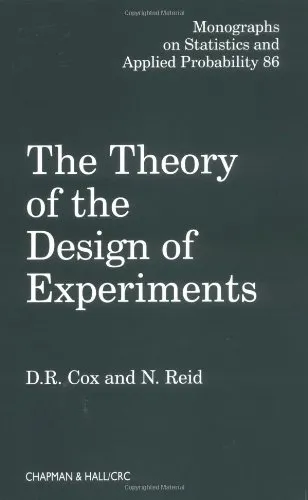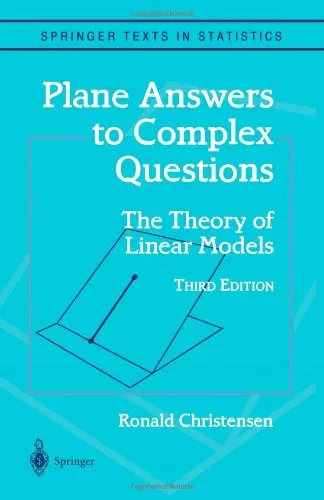The Theory of the Design of Experiments
4.5
Reviews from our users

You Can Ask your questions from this book's AI after Login
Each download or ask from book AI costs 2 points. To earn more free points, please visit the Points Guide Page and complete some valuable actions.Related Refrences:
Introduction to "The Theory of the Design of Experiments"
"The Theory of the Design of Experiments" by D.R. Cox and Nancy Reid is a comprehensive and authoritative text on the methodology and principles underlying the design of experiments. This book focuses on the careful planning and structuring of studies to extract meaningful insights from observations while considering practical and theoretical constraints. Aimed at statisticians, researchers, and applied scientists, this work provides a thoughtful exploration of how experiments can be designed to optimize information gain, reduce bias, and increase efficiency across diverse fields of application.
Since its publication, this book has been widely regarded as an essential resource for anyone engaged in statistical design and analysis, offering a clear exposition of fundamental concepts alongside illustrative examples. It delves deeply into both the theoretical and practical aspects of experimental design, ensuring readers gain not only conceptual understanding but also the ability to apply these principles in a wide array of real-world contexts. Whether you're a beginner or an experienced professional, "The Theory of the Design of Experiments" is sure to deepen your understanding of this critical area of study.
Detailed Summary of the Book
At its core, this book addresses the key question: how can experiments be constructed to yield the most reliable and useful results while minimizing confounding factors? It begins with the historical context surrounding the development of experimental design and progresses to cover essential topics such as randomization, replication, and factorial structures.
The authors emphasize the importance of clear objectives and carefully chosen measurement strategies, offering advice on balancing practical constraints—such as resources, time, or ethical considerations—with the need for unbiased and informative data. Detailed discussions include topics such as:
- The distinction between observational and experimental studies
- The role and importance of randomization
- Blocking and stratification to reduce variability
- Factorial and fractional factorial experiments
- Implementation challenges and practical considerations
Throughout the book, examples and case studies are incorporated to ground the theoretical principles in actual practice. These examples span multiple disciplines, illustrating the versatility of the design-of-experiments framework and its potential for solving complex real-world problems.
Key Takeaways
Readers of "The Theory of the Design of Experiments" will walk away with a clear understanding of the foundational principles in experimental design. Key takeaways include:
- The crucial role of randomization in controlling for hidden biases
- How replication ensures robust and repeatable results
- Strategies for reducing variability through blocking and stratification
- The power of factorial experiments for understanding interactions between factors
- The importance of integrating theoretical rigor with practical constraints
By grasping these principles, readers will be better equipped to design experiments that yield actionable and scientifically reliable insights regardless of their field of study.
Famous Quotes from the Book
Within "The Theory of the Design of Experiments," readers will encounter many insightful observations and thought-provoking statements. Here are some memorable quotes:
- "Randomization is not solely a technique but a guiding principle in experimental design."
- "Replication is not merely repetition; rather, it is the foundation from which experimental conclusions gain strength."
- "Every experiment involves a balance between idealized theoretical designs and practical feasibility."
- "The design of experiments is as much an art as it is a science—a continuous dialogue between creativity and constraints."
Why This Book Matters
"The Theory of the Design of Experiments" is not just another statistics textbook; it is a timeless guide for anyone seeking to conduct high-quality, reliable, and impactful research. Its importance lies in its ability to bridge the gap between rigorous mathematical statistics and the often-messy reality of applied research.
Designed to accommodate readers from diverse professional backgrounds, the book provides tools and frameworks that can be adapted to various scientific fields, including agriculture, engineering, medicine, psychology, and social sciences. It brings special relevance in today's era of evidence-based practice and data-driven decision-making, where the design of experiments often underpins major scientific breakthroughs or policy decisions.
By focusing not only on technical methods but also on the principles and philosophy underlying experimental design, this book ensures that its teachings remain evergreen, applicable across generations of researchers and practitioners. It is a must-read for anyone aiming to achieve excellence in experimental research and statistical practice.
Free Direct Download
You Can Download this book after Login
Accessing books through legal platforms and public libraries not only supports the rights of authors and publishers but also contributes to the sustainability of reading culture. Before downloading, please take a moment to consider these options.
Find this book on other platforms:
WorldCat helps you find books in libraries worldwide.
See ratings, reviews, and discussions on Goodreads.
Find and buy rare or used books on AbeBooks.
1333
بازدید4.5
امتیاز0
نظر98%
رضایتReviews:
4.5
Based on 0 users review
Questions & Answers
Ask questions about this book or help others by answering
No questions yet. Be the first to ask!













